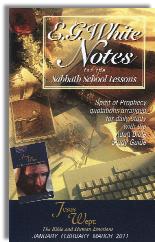|
||||||||||||||
Commentary on "Good Thinking"
Day 6: Thursday, February 3, 2011 - The Peace of Christ in Our Hearts
Overview
The Lesson author now asks us what specific actions we are called to perform to live life in Christ. Colossians 3:1-17 is examined, and that passage directs us to the heart and mind as the root of morality. Jesus works goodness in us by governing our thoughts, and as our source of peace and goodness, He will help us acquire virtue and character.
“Avoiding sin and acquiring virtue are matters of choice and preparation, not improvisation,” the Lesson says. Since it is essential to be under the care of Jesus for character development to progress, we must keep our thoughts stayed on God, as Ellen White stated, so they “will be guided by divine love and power.”
Although we understand little of how thought works, we know that deep in our consciousness we are able to make choices of what we will think about. The author admits that for some of the mentally ill, their ability to change their thoughts is impaired, and professional treatment is recommended.
Observations
This Lesson has the order of priorities in Colossians 3 inverted, and it repeats some of the same errors of the Colossian church. In the first two chapters, Paul has explained to the believers that instead of exalting Christ, they had exalted celestial beings, human wisdom, and enforced human regulations. These were contrary to Christ’s supremacy and adequacy.
“For in him the whole fullness of deity dwells bodily, and you have been filled in him.” Colossians 2:9,10a
As believers in Christ, “God made us alive together with Him, having forgiven all our trespasses” (2:13b). We are now to reckon ourselves dead to sin and alive to Christ. Our union with Him is so intimate and complete, we may reckon ourselves seated with Christ in heaven, already saved and glorified with Him.
But the Colossians were not satisfied with their high position in Christ, and looked for security in human wisdom and regulations—the “elemental spirits of the world.” This Lesson travels a similar path. There is so little here about the Gospel of Jesus’ life, death and resurrection as our Substitute, or how His mighty accomplishments purchased our security through His blood. The powerful sense of Christ’s sufficiency and personal sovereignty over our destinies is sadly missing. Elemental spirits have replaced our fullness in Christ, the Firstborn of all creation.
You will find a great deal here about the psychology of right thinking, and divine-human management of one’s lifestyle through “choice and preparation.” Add to that the thousands of regulations in the writings of Ellen White, and you have what Paul called “human precepts and teachings” with “an appearance of wisdom in promoting self-made religion…but they are of no value in stopping the indulgence of the flesh.”
The practical moral obligations of chapter 3 all flow from the believer’s confidence in Christ as his “head” who presents us “holy and blameless and above reproach before him” (Col. 1:22). Only this level of confidence in our heavenly position will result in demoting self and showing compassion to others. “Do everything in the name of the Lord Jesus.” Otherwise, human pride will look for human regulations and wisdom in self-improvement programs.
Now for those suffering mental illness, especially severe thought disorders, the Lesson’s “choice,” “preparation,” and thought management program presents a problem. Professional treatments have very mixed results, as any clinician can tell you. Psychotropic medication is often a prolonged chemistry experiment, and for many patients, a modest reduction in symptoms is a realistic prognosis. We can thank God for the success that dedicated professionals have achieved. However, human treatment does not replace the Holy Spirit, who can bring spiritual life to anyone, no matter what the medical diagnosis.
We can be more grateful to God that our hope is not set on the soundness of our choices or planning abilities, but on the sufficiency of Jesus Christ.
“Those who are well have no need of a physician, but those who are sick. I come not to call the righteous, but sinners.” Mark 2:17
Summary
- The Colossian believers exalted human wisdom and regulations instead of exalting Christ as all-sufficient.
- This Lesson makes similar errors in exalting thought control philosophy, while demoting the Gospel of Christ’s blood and righteousness for sinners.
- Christian moral behavior flows from confidence in Christ who presents us “holy and blameless before him.” Only this level of confidence in our heavenly position can produce the love Christ commands.
- Mental health problems often challenge the resources of human treatment programs. The Holy Spirit never fails to bring anyone spiritual life, no matter what the medical diagnosis.
- Our hope is founded on the sufficiency of Christ, and not on the soundness of our mental abilities.
Copyright 2011 BibleStudiesForAdventists.com. All rights reserved. Revised February 3, 2011. This website is published by Life Assurance Ministries, Camp Verde, Arizona, USA, the publisher of Proclamation! Magazine. Contact email: BibleStudiesForAdventists@gmail.com.
The Sabbath School Bible Study Guide and the corresponding E.G. White Notes are published by Pacific Press Publishing Association, which is owned and operated by the Seventh-day Adventist church. The current quarter's editions are pictured above.
Official Adventist Resources
Standard Edition Study Guide Week 6
Teacher's Edition Study Guide Week 6


